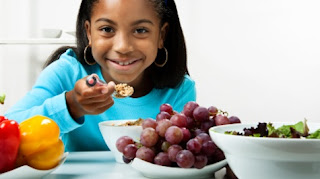Academy of Nutrition and Dietetics
Vegetarian diets are growing more and more common. If you are considering becoming a vegetarian, there are several things to keep in mind to maintain a healthful diet. Generally, there are four different types of vegetarians:
- Strict vegetarian or vegan: A vegetarian diet that excludes all animal products such as meat, poultry, fish, eggs, milk, cheese and other dairy products
- Lactovegetarian: A vegetarian diet that excludes meat, poultry, fish and eggs but includes dairy products
- Lacto-ovovegetarian: A vegetarian diet that excludes meat, poultry and fish but includes eggs and dairy products. Most vegetarians in the United States fall into this category.
- Flexitarian: A semi-vegetarian diet with a focus on vegetarian food with occasional meat consumption.
No matter which category of vegetarian you fall into, it is important to choose a variety of foods, including whole grains, fruits, vegetables, legumes, nuts and seeds. Using the Vegetarian Food Pyramid can help you make sure you are meeting your nutritional needs each day.
Calcium
Vegetarians should consume a variety of calcium sources in order to meet daily requirements. Studies have shown vegetarians absorb and retain more calcium from foods than do non-vegetarians.
Dairy products are a rich source of calcium. If dairy products are not included in your diet, adequate amounts of calcium can be obtained from plant foods. Lactovegetarians can get plenty of calcium from fortified soymilk, nonfat yogurt and lowfat cheeses. Here are some other vegetarian-friendly sources of calcium:
- Cow's milk
- Fortified soymilk or rice milk
- Leafy green vegetables
- Broccoli
- Beans
- Calcium-fortified juice
- Calcium-set tofu
- Almonds and almond butter
- Sesame seeds and sesame butter (tahini)
- Soy nuts
- Blackstrap molasses
- Figs
Iron
Vegetarians should consume a variety of iron sources to meet daily requirements. Consuming a good source of vitamin C (citrus fruits, orange juice, tomatoes) at each meal increases iron absorption. Good sources include dried beans, dark green vegetables like spinach and beet greens, dried fruits, prune juice, blackstrap molasses and fortified breads and cereals. Other good vegetarian-friendly sources of iron include:
- Instant oatmeal
- Nuts and nut butters
- Potatoes (eaten with skin)
- Enriched pasta
Protein
Protein is found in most plant foods as well as animal foods. Your body will make its own complete protein if a variety of foods and enough calories are eaten during the day. Good sources of protein include:
- Beans
- Whole grains
- Soy products
- Nuts and nut butters
- Dairy products
- Eggs
Vitamin B12
B12 is found in all foods of animal origin, including eggs and dairy products. An adequate intake of vitamin B12 is generally not a concern for vegetarians who eat some dairy products or eggs. Strict vegetarians or vegans, however, may need to supplement their diet by choosing a fortified breakfast cereal or by taking a vitamin B12 (cobalamin) supplement of no more than 100 percent of the Daily Value. Good sources of B12 include:
- Vitamin B12-fortified foods (nutritional yeast, soymilk, meat analogs or ready-to-eat cereals. Be sure to check the label.)
- Dairy products
- Eggs
Vitamin D
Few foods are naturally high in vitamin D, but dairy products are fortified with vitamin D in the United States. People who choose not to eat dairy products and who do not receive exposure to sunlight on a regular basis may wish to consider taking a vitamin D supplement of no more than 100 percent of the Daily Value. Good sources of vitamin D include:
- Eggs
- Vitamin D-fortified foods (soymilk, cow's milk, orange juice, ready-to-eat cereals)
- Vitamin D is also made in the skin from sunlight.
Healthful Vegetarian Meal Ideas
A vegetarian diet can include just as many tasty varieties as one including meat. Don't hesitate to get creative in the kitchen. Try these healthful, vegetarian meal ideas:
Breakfast
- Cereal with milk (soymilk if vegan)
- Whole-wheat toast with margarine or jelly and a piece of fresh fruit
- Instant oatmeal with nuts, raisins and (soy)milk
Lunch
- Vegetable sandwich (tomatoes, peppers, onions, avocado) with or without (soy)cheese on whole-grain bread
- Vegetable soup with a piece of whole-grain toast
- Vegetable burger or falafel with (soy)cheese, mushrooms and tomato on whole-grain bread
- Pita bread filled with vegetables or peanut butter
- Chili with beans, textured vegetable protein and (soy)cheese.
Dinner
- Tofu stir-fry with brown rice
- Whole-grain pasta with tomato sauce plus vegetables (mushrooms, tomatoes, eggplant, peppers and onions)
- Tacos or burritos filled with beans, textured vegetable protein, tofu or tempe
- Pizza with or without cheese and topped with vegetables, tofu or meat substitute.
Snacks
- Dried fruits
- Trail mix
- Popcorn
- Rice cakes
- Yogurt
- Smoothies made with calcium fortified rice milk, soymilk or cow's milk
- Hummus
- Bagels with nut butter
- Instant soups.
Information provided by Vegetarian Nutrition, a dietetic practice group of the Academy of Nutrition and Dietetics.
Reprinted with permission from the Academy of Nutrition and Dietetics, http://www.eatright.org.


No comments:
Post a Comment